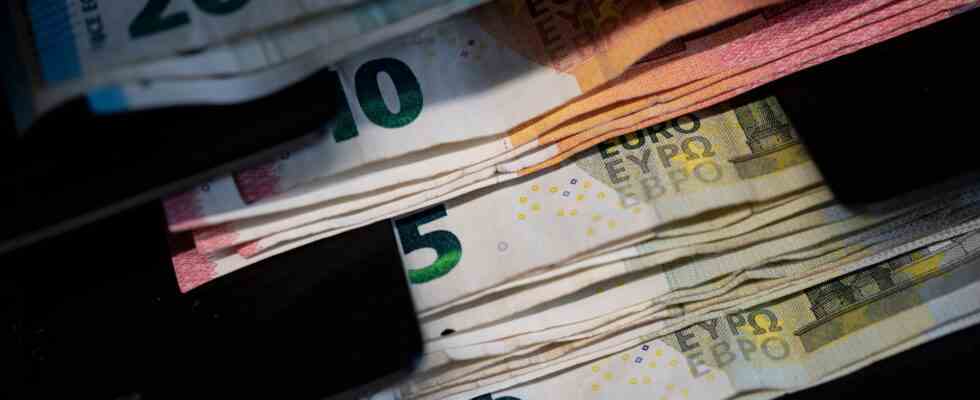Status: 22.11.2022 5:55 a.m
476 billion euros on 3289 pages: the federal budget for 2023 is a heavyweight. The billions for the Bundeswehr and “double booms” run through extra pots. The debt brake? holds
The federal budget for the coming year is listed on 3289 pages. Columns of figures and explanations for each individual ministry, for income, expenditure, borrowing and interest charges. For Finance Minister Christian Lindner, one thing is particularly important in all the figures – the observance of the key campaign promise of the FDP: “The 2023 budget complies with the debt brake of the Basic Law,” said Lindner recently after the Budget Committee of the Bundestag finalized the 2023 budget had poured.
At the same time, however, Lindner practiced verbal acrobatics: “The regular federal budget shows how the traffic light coalition would deal with public finances if it weren’t for the special burdens caused by the crisis.” A debt brake in the subjunctive, adapted to the special circumstances.
Because the “crisis-related special burdens” have been outsourced to the debt-financed special assets for the most part – bypassing the actual budget. 100 billion euros for the Bundeswehr and 200 billion euros for the so-called defense shield, to finance the planned electricity and gas price brakes, Chancellor Olaf Scholz’s “double boom”.
Christian Haase, the budget spokesman for the Union faction, is not entirely honest about Lindner’s budget because of the special assets. “Of course, Germany is now taking on a lot of debt. And that will also weigh on us in the future.”
Debt brake with an economic component
The debt brake was included in the constitution in 2011. It limits the government’s scope for borrowing. With the beginning of the pandemic, the debt brake was suspended in 2020 – three years in a row. And the state took out loans like never before. In the current budget alone, almost 140 billion euros. It should be 45 billion euros in the coming year – as much as the debt brake just allows.
And that is even an unexpected amount, since the debt brake has an economic component built in. In the event of an imminent recession, as is forecast for the coming year, the federal government may take on more debt than in an upswing. CDU budget politician Haase would have liked the coalition to make more savings: “Nothing illegal is happening. But the possibility of taking on debt doesn’t mean that you have to take it on.”
Housing benefit, Heinz cost subsidy, citizen benefit
Lindner wants to spend 476 billion euros in the coming year. That is around 30 billion euros more than this year. One focus here: Relief in the energy crisis. The adjustment of income tax to inflation should keep employees more money, the reform of housing benefits and a heating subsidy should benefit those in need. In addition, the child benefit will be increased. The citizens’ benefit, which has not yet been decided, should also have an impact. Lindner speaks of a sustainable financial policy while at the same time relieving the burden on the population and helping those in need in solidarity.
However, most of the costs to be expected in Germany as a result of the Russian war in Ukraine have been outsourced to the special assets of the Bundeswehr and the defense shield, which add up to 300 billion euros. The special assets must be gradually repaid from 2031 – including interest. In the Economic Stabilization Fund (WSF) to cushion the energy crisis, interest payments of up to 4.4 billion euros could already be incurred in the coming period. The WSF contains a corresponding title, which, however, depends on the actual outflow of funds – for example for the electricity and gas price brakes.
Expensive interest rates
This shows once again: Borrowing now costs a lot of money. In the federal budget for 2023, 39 billion euros are now earmarked for interest only. In 2021 it was just under four billion euros. For comparison: The budget of the Federal Ministry of Education and Research is around 22 billion euros. The interest costs thus significantly exceed the federal government’s expenditure on education and research.
What is the debt brake worth then? From the point of view of the budget spokesman for the FDP parliamentary group, Otto Fricke, it has a disciplining effect – especially with a view to the future. Because spending requests keep coming from all ministries. One could then reply: “No, that’s not possible because the debt brake in the constitution says so.”
And for the borrowing that has been outsourced to special funds, Fricke tries to use a linguistic image: “The debt brake ensures that the water does not overflow the dyke. And the special funds provide security at the back to strengthen the dyke.”
Billions upon billions: the budget broken down
Hans-Joachim Vieweger, ARD Berlin, 22.11.2022 5:55 a.m

